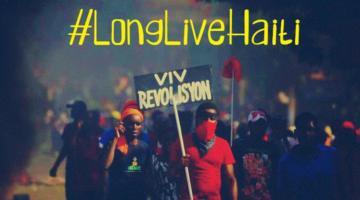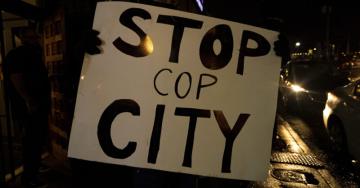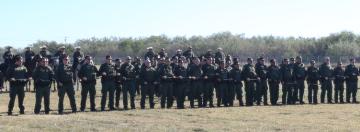This proclamation by Jean Jacques Dessalines, the first leader of a free Haiti, is one of the most radical declarations of freedom in history.
Jean-Jacques Dessalines’s 8 April 1804 proclamation to the Haitian people is among the most stunning critiques of race, slavery, colonialism, and white barbarity to have emerged in modern history. It is also a profoundly radical statement on Black freedom and self-determination, and the morality of revolutionary violence. On January 1, 1804, after a thirteen-year struggle marked by imperial intrigue and sanguinary violence, Dessalines declared Haiti an independent republic, forever abolishing slavery on the island. In the following months, he ordered the killing of the remaining white French colonists in the republic as a means towards preserving Haiti’s independence. Polish and German colonists were spared. But news of Dessalines’s actions quickly spread throughout the white Atlantic world, as French refugees to Philadelphia, Havana, New Orleans, and elsewhere recounted stories of the tragic horrors that had befallen the white planters and former slave owners of Saint-Domingue, and of the “savagery” of Dessalines and his soldiers.
In response, Dessalines issued a proclamation from Le Cap under the banner “Liberty or Death” in which he justified his actions as both acts of vengeance for the years of white savagery and brutality under French rule, and acts of necessity to preserve the sovereignty of Haiti. He also outlined a startling and far-sighted vision of what was needed to preserve Haiti’s independence for future generations. In the first instance, Dessalines urged the necessity of the maintenance of an accord between “Black and yellow,” that is, Africans and mulattos. In the second instance, he understood that white foreign ownership of Haiti’s land or people would lead to the downfall of the Republic. “Never again shall a colonist or an European set his foot upon this territory with the title of master or proprietor,” Dessalines declared. “This resolution shall henceforward form the fundamental basis of our constitution.” In many respects, Haiti’s history after 1804 has been marked by a continuous struggle against those Europeans (and their evil spawn, the US) to undermine both demands.
“Liberty or Death” was translated into English from the French original, and reprinted widely in journals and annuals in the United States and England. It was often prefaced with a statement describing the horrors of emancipation and the imminent dangers of Black self-determination. Arguably, the proclamation is a sort of foundational text jutifying more than two-hundred years of the demonization of Haiti. At the same time, it often becomes used by those contemporary white historians who, despite their “love” for Haitian history, spend more time attacking Dessalines’ actions than they do the violence of white rule and enslavement. Dessalines anticipated the critiques. “Inhabitants of the universe, do not, unheard, accuse us of cruelty,” he stated in another proclamation, this time from Gonaives on 2 May 1804, “Remember our past sufferings, and you will judge less severely our present acts of necessity -- of despair.”
LIBERTY OR DEATH.
JEAN JACQUES DESSALINES, Governor-General, of the Inhabitants of Hayti.
Crimes, the most atrocious, such as were until then unheard of, and would cause nature to shudder, have been perpetrated! The measure was overheaped. At length the hour of vengeance has arrived, and the implacable enemies of the rights of man have suffered the punishment due to their crimes.
My arm, raised over their heads, has too long delayed to strike. At that signal, which the justice of God has urged, your hands, righteously armed, have brought the axe upon the ancient tree of slavery and prejudices. In vain had time, and more especially the infernal politics of Europeans, surrounded it with triple brass! You have stripped it of its armour; you have placed it upon your hearts, that you may become (like your natural enemies) cruel and merciless. Like an overflowing mighty torrent that tears down all opposition, your vengeful fury has carried away every thing in its impetuous course. Thus perish all tyrants over innocence, all oppressors of mankind!
What then? Bent for many ages under an iron yoke; the sport of the passions of men, of their injustice, and of the caprice of fortune; mutilated victims of the cupidity of white Frenchmen; after having fattened with our toils these insatiate blood-suckers, with a patience and resignation unexampled, we should again have seen that sacrilegious horde make an attempt upon our destruction, without any distinction of sex or age; and we, men without energy, of no virtue, or no delicate sensibility, should not we have plunged in their breast the dagger of desperation? Where is that vile Haytian, so unworthy of his regeneration, who thinks he has not accomplished the decrees of the Eternal, by exterminating these bloody-thirsty tigers? If there is one, let him fly; indignant nature discards him from our bosom; let him hide his shame far from hence; the air we breathe is not suited to his gross organs; it is the pure air of Liberty, august and triumphant.
Yes, we have rendered to these true cannibals war for war, crime for crime, outrage for outrage; yes, I have saved my country; I have avenged America. The avowal I make of it in the face of earth and heaven, constitutes my pride and my glory. – Of what consequence to me is the opinion which contemporary and future generations will pronounce upon my conduct? I have performed my duty; I enjoy my own approbation; for me that is sufficient. But what do I say? The preservation of my unfortunate brothers, the testimony of my own conscience are not my only recompense: I have seen two classes of men, born to cherish, assist and succour one another – mixed in a world, and blended together – crying for vengeance, and disputing the honor of the first blow.
Blacks and yellows, whom the refined duplicity of Europeans has for a long time endeavoured to divide; you, who are now consolidated, and make but one family; without doubt it was necessary that our perfect reconciliation should be sealed with the blood of your butchers. Similar calamities have hung over your proscribed heads; a similar ardour to strike your enemies has signalized you: the like fate is reserved for you, and the like interests must therefore render you forever one, indivisible, and inseparable. Maintain that precious concord, that happy harmony amongst yourselves; it is the pledge of your happiness, your salvation, and your success: it is the secret of being invincible.
It is necessary, in order to strengthen these ties, to recall to your remembrance the catalogue of atrocities committed against our species: the massacre of the entire population of this Island, mediated in the silence and sang froid of the cabinet: the execution of that abominable project, to me unblushingly proposed, and already begun by the French with the calmness and serenity of a countenance accustomed to similar crimes. Guadeloupe pillaged and destroyed: its ruins still reeking with blood of children, women and old men put to the sword: Pelage (himself the victim of their craftiness) after having basely betrayed his country and his brothers: The brave and immortal Delgresse, blown into the air with the fort which he defended, rather than accept their offered chains. Magnanimous warrior! that noble death, far from enfeebling our courage, serves only to rouse within us the determination of avenging or of following thee. Shall I again recal [sic] to your memory the plots lately framed at Jeremie? the terrible explosion which was to be the result, notwithstanding the generous pardon granted to these incorrigible beings at the expulsion of the French army? The deplorable fate of our departed brothers in Europe! and (dread harbinger of death) the frightful despotism exercised at Martinique. Unfortunate people of Martinique, could I but fly to your assistance, and break your fetters! Alas, an insurmountable barrier separates us…... Perhaps a spark from the same fire which inflames us, will alight into your bosoms: perhaps at the sound of this commotion, suddenly awakening from your lethargy, with arms in your hands, you will reclaim your sacred and imprescriptible rights.
After the terrible example which I have just given, that, sooner or later Divine Justice will unchain on earth some mighty minds, above the weakness of the vulgar, for the destruction and terror of the wicked--tremble, tyrants, usurpers, scourges of the new world! our daggers are sharpened; your punishment is ready! sixty thousand men, equipped, inured to war, obedient to my orders, burn to offer a new sacrifice to the manes of their assassinated brothers. Let that nation come who may be mad and daring enough to attack me. Already at its approach, the irritated genius of Hayti, rising out of the bosom of the ocean, appears; his menacing aspect throws the waves into commotion, excites tempests, and with his mighty hand disperses ships, or dashes them in pieces; to his formidable voice the laws of nature pay obedience; diseases, plague, famine, conflagration, poison, are his constant attendants. But why calculate on the assistance of the climate and of the elements? Have I forgot that I command a people of no common cast, brought up in adversity, whose audacious daring frowns at the obstacles and increases by dangers? Let them come, then, these homicidal cohorts! I wait for them with firmness and with a steady eye. I abandon to them freely the sea-shore, and the places where cities have existed; but woe to those who may approach too near the mountains! It were better for them that the sea received them into its profound abyss, than to be devoured by the anger of the children of Hayti
“War and death to Tyrants!” this is my motto; “Liberty! Independence!” this is our rallying cry
Generals, officers, soldiers, a little unlike him who has preceded me, the ex-general Toussaint Louverture, I have been faithful to the promise which I made to you when I took up arms against tyranny, and whilst the last spark of life remains in me I shall keep my oath. “Never again shall a colonist or an European set his foot upon this territory with the title of master or proprietor.” This resolution shall henceforward form the fundamental basis of our constitution.
Should other chiefs, after me, by pursuing a conduct diametrically opposite to mine, dig their own graves and those of their species, you will have to accuse only the law of destiny which shall have taken me away from the happiness and welfare of my fellow-citizens. May my successors follow the path I shall have traced out for them! It is the system best adapted for consolidating their power; it is the highest homage they can render to my memory.
As it is derogatory to my character and my dignity to punish the innocent for the crimes of the guilty, a handful of whites, commendable by the religion they have always professed, and who have besides taken the oath to live with us in the woods, have experienced my clemency. I order that the sword respect them, and that they be unmolested.
I recommend anew and order to all the generals of departments, etc. to grant succours, encouragement, and protection, to all neutral and friendly nations who may wish to establish commercial relations in this island.
Head-quarters at the Cape, 28th April, 1804, first year of independence.
The Governor-General
(Signed) DESSALINES
The Secretary-General, JUSTE CHANLATTE
A true copy.
This version of Jean Jacques Dessalines, “Liberty or Death! Proclamation,” was transcribed from “Orders issued by Dessalines, in the capacity of governor-general,” The New Annual Register, or, General Repository of History, Politics, and Literature For the Year 1804 (1805): 192-195.



















